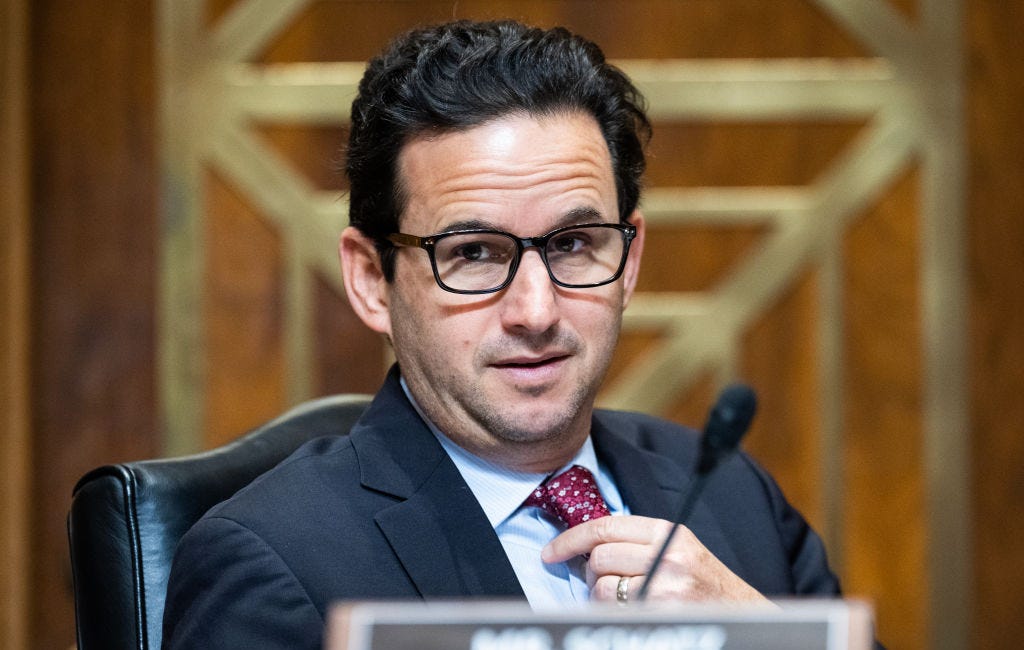Answering "the next question" on Israel and Gaza
As Biden halts arms shipments to Israel, what's ahead for the conflict in Gaza?
We last talked to Senator Brian Schatz of Hawaii just after Senate Majority Leader Chuck Schumer had — surprisingly, given his staunch support for Israel until that point — criticized Israeli Prime Minister Benjamin Netanyahu as an “obstacle to peace.” For Schatz, the logical “next question” was whether the U.S. would follow through by stopping arms shipments to Israel.
Now that question has been answered, at least for the moment. Biden has — beginning with the pause of a planned shipment of 3,500 bombs — temporarily halted transfers of arms to Israel in opposition to the Netanyahu government’s plans for a larger assault on Rafah and the continuing refusal of the Israeli government to engage with U.S. diplomatic efforts during the ongoing ceasefire negotiations with Hamas. Other pending shipments hang in the balance, and while, as Schatz pointed out to us, it is unlikely that the U.S. would cut off all armament shipments to Israel, it’s a real change in the relationship and the first serious use of Biden’s leverage so far.
“It’s just wrong,” the president has said of Netanyahu’s plans for Rafah. And whether that’s Biden acting out of his own sense of personal decency or reacting to widespread dissent in the U.S., including the protests that have been roiling university campuses, there’s no question the mood is shifting. You need only look at the polls (which now show majorities disapproving of Israeli military actions in Gaza and in favor of increased humanitarian aid).
Dig deeper with Senator Schatz’s prescient comments to us about the idea of conditioning military aid to Israel:
Whenever we do appropriations, whether it's domestic or defense, we have conditions on the expenditure of those funds. This idea that you put conditions on the resources we provide a small non-profit in the state of Hawaii, but not on those we provide to a defense force in the middle of a hot war, just defies common sense.
A request for those who haven’t yet joined us: The interviews and essays hat we share here take research and editing and much more. We work hard, and we are eager to bring on more writers, more voices. But we need your help to keep this going. Join us today to support the kind of independent media you want to exist.
And today we’re offering new paying subscribers a special discount of 20 percent. You will lock in this lower price forever if you join us now!
Meanwhile, on the mood of dissent here in the United States and its likely impact, we look at what Wesleyan University’s leader, Michael Roth, talked to us about this week:
Yes, I think the protests are a problem for politics in the fall unless young people take the political energies they’ve experienced and turn those energies toward building coalitions at home to win the next round of elections and to pass legislation that might facilitate the creation of a more just and peaceful world.
But at a time when we should be putting our full attention on getting a humanitarian ceasefire in Gaza, we are instead talking about fancy college campuses. At some schools, protesters seem more interested in investment policies or in campus disruption than in doing anything meaningful for Gazans. The media finds it easier to cover Columbia than Rafah. Let’s instead pay attention to the right things: We need a ceasefire and a return of the hostages now, and we need to get aid to Gaza.
And in light of the insightful observation Heather McGhee makes regarding the place of Israel in Biden’s moral and political upbringing and the deeply held positions of his generation, we wonder whether this moment represents a significant shift in thinking:
I think that on the question of Israel, it’s almost a similar snapshot in time that is his limitation. The people whose politics were formed by the notion of Israel as reparations for the Holocaust are not going to move from that easily, because in their moral understanding, as Peter Beinart says, Israel is like America, a promised land amidst a hostile frontier, so it makes sense. That doesn't mean Biden can't be moved and hasn’t already been moved by Uncommitted organizing and ceasefire organizing from the left well into the center. You have the Service Employees International Union coming out for a ceasefire. These are janitors and nannies and home health care aides. You have 1,000 Black pastors. It has been an astonishingly powerful grassroots movement that in the polling reaches well into the durable majority that Biden needs, and they are morally outraged by what’s going on in our name and with our dollars and our weapons.
And, as we have pointed out before, dissent, expressed lately in the form of student protests, is part of how society evolves.









